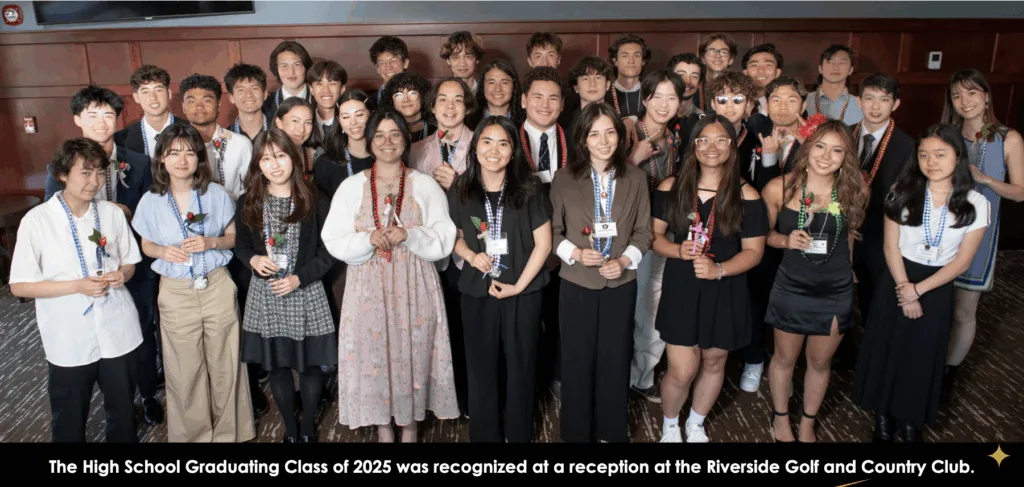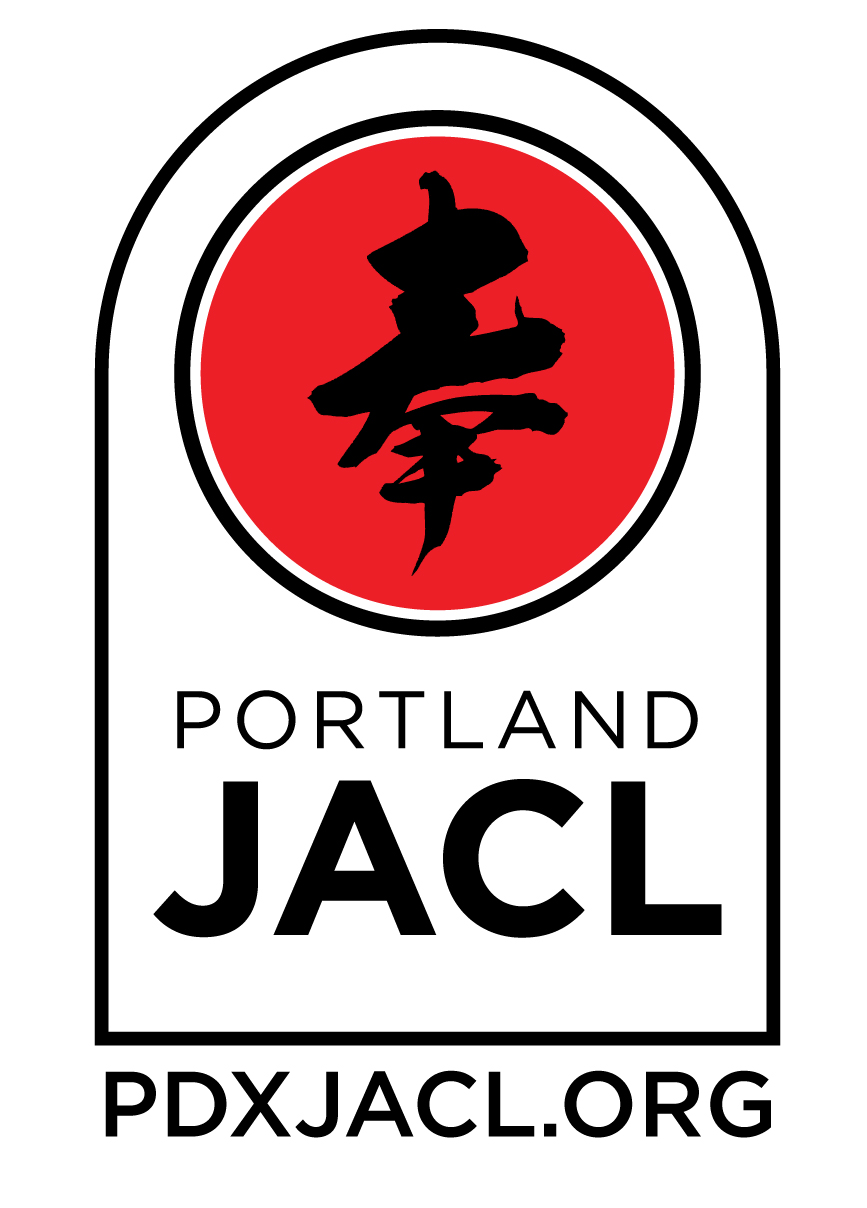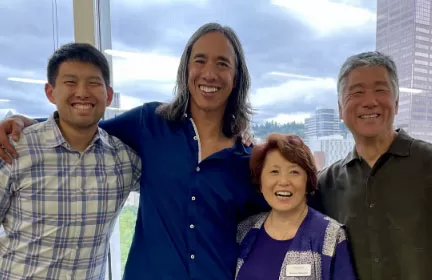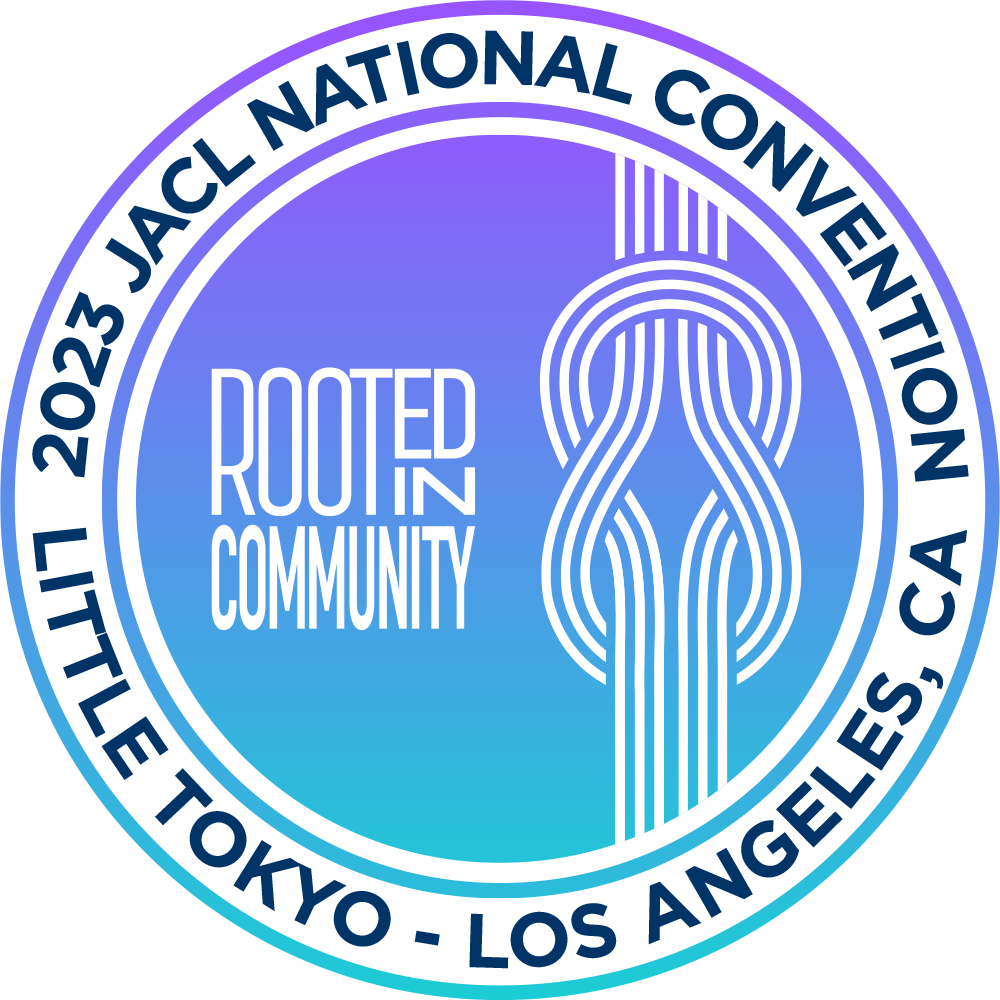By Heidi Kimiko Tolentino
This year was the 78th annual Japanese American Community Graduation Banquet. The banquet was unique in that it was held at a new location and had an immense number of graduates. The event was held at the Riverside Golf and Country Club and 36 graduates were honored. The event was Emceed by Todd Yuzuriha, a dedicated member of the Japanese American community. Todd was part of the 1978 Japanese American Community Banquet, is an All-American trumpet player who is part of the Minidoka Swing Band and works tirelessly volunteering in the Japanese American community.
The Pledge of Allegiance was led by Commander Ron Iwasaki and the words before and after the meal were given by Reverend Kosho Finch of Henjyogi Buddhist Temple. The Consul General of Japan, Ken Todoriki, spoke to the graduates and encouraged them to stay connected to their community and their roots in Japan. He offered the graduates and their families congratulations and noted that he was proud to be in attendance as this is his first assignment in the US.
This year’s keynote speaker was Ms. Hanako Wakatsuki-Chong, the Executive Director of Japanese American Museum of Oregon (JAMO). Ms. Wakatsuki-Chong has an impressive resume that encompasses everything from working for the Idaho State Historical Society to working in the White House’s Office of the Chief of Staff. In 2021, she received the Esto Perpetua Award for Lifetime Achievement from the Idaho State Historical Society for her work in preservation of Japanese American Incarceration history in Idaho.
Ms. Wakatsuki-Chong focused her speech on words of wisdom for the graduating class of 2025. As a first-generation college student, she found that it was important to find the people who would help and support her during her long journey. Her father encouraged her to spread her wings and leave the nest, but she knew she needed a community to support her. Wakatsuki-Chong worked three jobs at the beginning of her college career to fund her education. Her college advisor worked with her to find scholarships and she was fueled by his assistance. She encouraged the graduates to find the people who are going to be your cheerleaders and help you each step of the way. She continued by explaining that they need to listen and be willing to open their eyes and ears to what they can learn from others. They also need to be brave and stand up for what they believe in and not be shy about advocating for themselves. She finished her motivational speech by telling them, “Get to know who you are and live without regret, but within reason.” Ms. Wakatsuki-Chong was an inspiration not only to the students, but to the whole community as they learned what she overcame to become an influential member of our community who works to make sure that Japanese American history will never be forgotten.
After Ms. Wakatsuki-Chong’s speech, the scholarship recipients were announced.
Mrs. Mark Sumida Awards The Mrs. Mark Sumida Awards are presented in memory of Alice Sumida. Alice Sumida was a long-time supporter of the Japanese American community and a generous donor to the graduation banquet. Alice Sumida passed away in August of 2018 at the age of 104. Mrs. Sumida wanted to award students in the community so that they would know their community was proud of them. This year, the awards were presented by Mr. Rich Iwasaki. This year’s recipients were Mason Birney of Tigard High School, Mona Brines of David Douglass High School, Kenshiro Duff of Grant High School, Issai Honda of Hudson’s Bay High School, Alexander Jimenez of Benson High School, Kiyoshi Kiyokawa of Sam Barlow High School, Masahiro Nakano of Westview High School, Ichiro Tanada of Central Catholic High School, Thelonius VanDam of Corbett High School, Lili Baechel of Grant High School, Aki Chambers of Lakeridge High School, Kelan Egusa of Grant High School, Sayuri Hara of Grant High School, Kai Maeda of Grant High School, Isaac Matsushima of David Douglas High School, Keiden Meyer of Grant High School, Dylan Nakaji of Grant High School, Issai Ono of Grant High School, Trillium Ono of Grant High School, Takumi Schmidt of Grant High School and Joshua Strege of Grant High School. Congratulations to all of these recipients!
Japanese Ancestral Society (JAS) Scholarships The Japanese Ancestral Society is a non-profit organization dedicated to serving the Nikkei community and promoting education and fellowship among the members of the community. JAS awards three scholarships: Hide Naito, Mary K. Naito and Sam Naito Scholarships. These were presented by Mr. Rich Iwasaki.
Hide Naito Scholarship Hide Naito was a Portland entrepreneur who started his first of several businesses in 1921 which diversified during his lifetime into retail operations, importing and real-estate development. The Hide Naito Donors are Sam and Marsha Naito. The winner of this year’s Hide Naito Scholarship was Selina Uehara of Beaverton Academy of Science and Engineering. Selina conducted research on pancreatic cancer alongside professional researchers, finished 1st in State for Future Health Professionals in EMT and Pharmacy Science Skills and competed for the Portland Ice Skating Club. Selina will be attending the University of Minnesota.
Mary K. Naito Scholarship Mary K. Naito was a homemaker, community volunteer, businesswoman and high school Valedictorian. A former Poston internee and UC Berkeley student, Mary managed Import Plaza for 20 years and served many local organizations with thoughtfulness and grace. Verne and Aki Naito represented the donor family at the banquet.. The winner of the Mary K. Naito Scholarship was Kou Yuasa from Sunset High School. Kou is Salutatorian of her class, a member of the marching bank who is a lead student conductor and trumpet sub-section leader and has attended the Portland Japanese School since 5th grade. Kou will be attending Waseda University in Japan.
Sam Naito Scholarship JAS honors Sam Naito with this scholarship. Sam Naito is a respected advisor, past president of JAS and advocate for education and social justice. This award is supported by the Southwest Washington Community Fund. The winner of this scholarship was Claire Coffey of Grant High School. Claire was an editor-in-chief of Grant Magazine which has won numerous awards. She was 2nd team All-PIL on the Grant Volleyball Team and she was co-President of Grant High School’s Japanese Immersion Program Student Council. Claire will be attending Northwestern University.
Gresham-Troutdale JACL (GT) JACL Scholarship The Gresham-Troutdale JACL is part of the oldest national civil rights organization in America. It serves to protect the rights of not only Asians, but all minorities, and nurtures the cultural heritage of Japanese Americans. Mr. Terry Nishikawa, President of GT JACL, presented the scholarship. The winner of the Gresham-Troutdale JACL Scholarship was Aiden Yee of Benson High School. Aiden is the Co-President of the Unite People Youth Group connected to Portland JACL, a competitive Rock Climber and a barista at Bobacat Tea House. Aiden will be attending the University of British Columbia.
Epworth United Methodist Church Scholarship Epworth United Methodist Church has evolved to become a reconciling congregation that welcomes people of all backgrounds and identities, and practices with an inclusive vision and in alignment with these values. The Epworth scholarship is provided to support the promotion of compassion, justice, and community building in our youth. Ms. Marilyn Sholian represented Epworth for this scholarship. The winner of the Epworth United Methodist Church Scholarship was Lindsay Persuad of Clackamas High School. Lindsay is a member of her school’s Student Athlete Leadership Team, earned All League Honorable Mention in Track and Field for discus and the 4×400 m relay. Lindsay will be attending Clackamas Community College.
Oregon Nisei Veterans Scholarships The Oregon Nisei Veterans began in 1948 with the purpose of raising money to build a monument to honor the Nisei soldiers killed in action during WWII. The Oregon Nisei Veterans awards two scholarships: The Art and Teri Iwasaki Scholarship and The Roger T. Okamoto Scholarship. The scholarships were presented by Mr. Paul Tamura.
Art and Teri Iwasaki Scholarship Art Iwasaki was a member of the 442nd Regimental Combat team during WWII and a founding member of Oregon Nisei Vets. Art was a recipient of the Congressional Gold Medal and this scholarship is given in memory of his loving wife, Teri. The winner of the Art and Teri Iwasaki Scholarship was Tyler Saito Takasumi from Oregon Episcopal School. Tyler was a paid coding instructor for elementary and middle school students, she won 1st place in the school science fair in cellular microbiology and she competes with the Rock Climbing Team at the Multnomah Athletic Club. Tyler will be attending Boston College.
Roger T. Okamoto Scholarship Second Lieutenant Roger Okamoto was killed in Vietnam in 1966 at the age of 23. Lieutenant Okamoto graduated from Benson High School and earned an engineering degree from the University of Washington. Mrs. Janice Okamoto and her son, Mr. Gary Okamoto, represented the family at the banquet. The winner of the Roger T. Okamoto Scholarship was Myles Mathies of Sam Barlow High School. Myles was a member of the Varsity Golf Team, and taught golf to kids. He also played Basketball and refereed middle school games. Myles will be attending Oregon State University.
Shokookai of Portland Scholarship Portland Shokookai was founded in 1966 by a small group of Japanese companies. They facilitate business operations for Japanese companies in Oregon and SW Washington and run the Japanese Language School. Mr. Yoshiyuki Hori presented the scholarship. This year’s Shokookai of Portland Scholarship winner was Ren Gregie of Grant High School. Ren was part of his school’s Constitution Team Unit that scored the highest in Oregon. He was a leader on the Cross Country and Track and Field teams and a member of Unite People. Ren will be attending the University of Oregon.
Portland JACL Scholarships Portland JACL was established in 1928 with an ongoing mission to fight social injustice and to preserve the cultural heritage and values of Japanese Americans. Portland JACL awarded four scholarships this year: Two Kiyoko Yumibe Scholarships, the Yoshiko Kennedy Scholarship and the Matt Matsuoka Scholarship. The scholarships were presented by Mr. Jeff Matsumoto, the President of Portland JACL.
Kiyoko Yumibe Scholarship #1 Kiyoko Yumibe was a hard-working Nisei who was incarcerated during WWII. She established a fund, through Portland JACL, to help support youth seeking higher education. Representing the donors at the banquet were Mr. and Mrs. Gary and Diane Onchi. The winner of the first Yumibe Scholarship was Avery Hughes-Davis of Vancouver iTech High School. Avery was the Student Body President, on a student advisory board for Vancouver Public Schools and volunteered 90-100 hours/year with the Oregon Buddhist Temple. Avery will be attending Georgetown University next year.
Kiyoko Yumibe Scholarship #2 The winner of the second Yumibe Scholarship was Reiko Nitta of Lincoln High School. Reiko was the Student Body Co-President, three time Class Co-President, and competed on the Cross Country, Track and Field, Swim and Synchronized Swimming teams. Reiko will be attending Georgia Institute of Technology next year.
Yoshiko Kennedy Scholarship Yoshiko Kennedy used her talents as a seamstress and master of Ikebana to ensure her children would receive an education. The Yoshiko Kennedy Scholarship was created in her memory. The winner of the Yoshiko Kennedy Scholarship was Hanako Duff of Grant High School. Hanako was an AP Scholar, started the Grant Badminton Club and tutored other students in SAT prep and Japanese. Hanako will be attending the University of Oregon next year.
Matt Masuoka Scholarship This scholarship honors Matthew Masuoka, a Nisei dentist, who was past president of Portland JACL in 1952, and Pacific Northwest District Governor in 1953-55. This scholarship is given in his honor by his daughter, Dr. Connie Masuoka, who helps organize the Graduation Banquet every year. The winner of the Matt Masuoka Scholarship was Lennon Kalapsa of Grant High School. Lennon was a certified member of the Oregon State Sheriff’s Search and Rescue team, worked as a Lifeguard with Portland Parks and Recreation and was a member of his school’s Track and Field Team. Lennon will be attending the University of Oregon.
The Veleda Club Scholarships The Veleda Club is Portland’s oldest Nikkei women’s service organization that is active in the community today. They are dedicated to supporting the community and preserving Japanese American heritage and traditions. The Veleda Club awarded two scholarships: the Veleda Club Scholarship and the Veleda Club Scholarship honoring Mrs. Misao Minagi. Mrs. Sharon Takahashi represented the Veleda Club.
The winner of the Veleda Club Scholarship was Midori Carollo of Ida B. Wells High School. Midori was a Varsity Cheerleader, she played and performed on Koto and she was a 13 year member of Girl Scouts. Midori will be attending the University of California Davis.
The Veleda Club Scholarship in honor of Mrs. Misao Minagi Mrs. Minagi was 105 years old when she passed away on March 1, 2025. She was an ardent supporter of our youth and this event. The winner of the Veleda Club Scholarship in honor of Mrs. Misao Minagi was Reon Sano-Ochiai of Mountain View High School. Reon conducted independent research at Reed College on retinal development, participated in the International Leadership Conference for Health Occupations and played on the Varsity Soccer Team. Reon will be attending the University of Oregon.
Nikkei Fujinkai Scholarship Portland Nikkei Fujinkai is a Japanese Ancestral Women’s Association that was established in 1935. They support community activities and cultural education. Mrs. Michie Uzunoe presented the scholarship. The winner of the Nikkei Fujinkai Scholarship was Koshi Takamiyagi of Early College High School. Koshi received the gold and silver in abacus competitions for Kawakami School Japan and placed 52nd nationally. He also tutors students in math at Portland Community College. Koshi will be attending Boston University next year.
The Graduate’s Response was given by Reiko Nitta of Lincoln High School. Reiko thanked the Japanese American community for helping the graduates and noted that the students thrived because of the community’s constant support. She also thanked all of the donors and noted that the entire event would not have been possible without the graduation banquet committee. Reiko said that she and the other graduates felt the love and support of the whole community and were grateful to be part of the Japanese American community.
The Ice Breaker Awards, a fun event for the graduates to learn about people in the Nikkei community, were given out by Mrs. Elaine Yuzuriha. She ended with a reminder to the graduates to return back to their community after they graduate and wished them well in their next steps.
Congratulations to the graduates of the class of 2025! You are a class filled with academic prowess, athletic abilities, commitment to your communities and so much more. We applaud you and look forward to hearing about your future endeavors.



